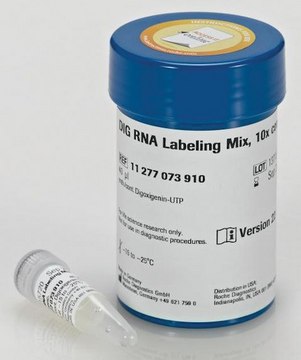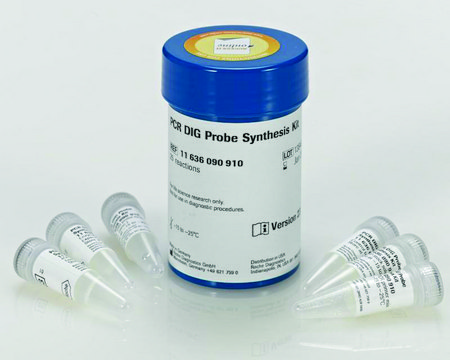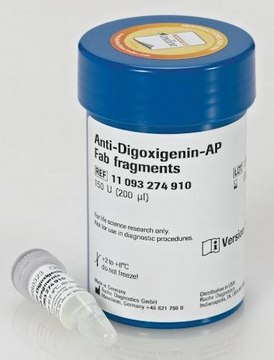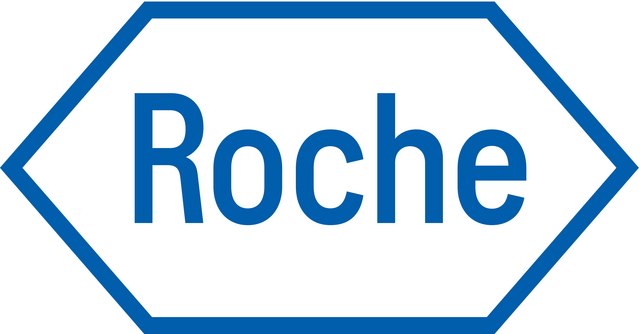11175033910
Roche
DIG DNA Labeling Kit
sufficient for 40 labeling reactions, kit of 1 (7 components), suitable for hybridization
Synonyme(s) :
dig, dna labeling kit, dig
Se connecterpour consulter vos tarifs contractuels et ceux de votre entreprise/organisme
About This Item
Code UNSPSC :
41105500
Produits recommandés
Utilisation
sufficient for 40 labeling reactions
Niveau de qualité
Conditionnement
kit of 1 (7 components)
Fabricant/nom de marque
Roche
Caractéristiques du produit alternatif plus écologique
Designing Safer Chemicals
Learn more about the Principles of Green Chemistry.
sustainability
Greener Alternative Product
Technique(s)
hybridization: suitable
Autre catégorie plus écologique
, Aligned
Température de stockage
−20°C
Description générale
DIG DNA Labeling Kit is a convenient kit for the labeling of DNA with Digoxigenin-deoxyuridine triphosphate (dUTP) using random oligonucleotides as primers. In this method, the complementary DNA strand of denatured DNA is synthesized by Klenow polymerase using the 3′-OH termini of the random oligonucleotides as primers.
We are committed to bringing you Greener Alternative Products, which adhere to one or more of The 12 Principles of Greener Chemistry. This product is designed as a safer chemical. The DIG System was established as a sensitive and cost-effective alternative to radioactivity for the labeling and detection of nucleic acids. There are many available publications that prove the versatility of the DIG System, so use of radio-labeling is no longer the only option for labeling of DNA for hybridization.
Spécificité
Heat inactivation: Stop the reaction by adding 2 μl 0.2 M EDTA (pH 8.0) and/or by heating to 65 °C for 10 minutes.
Application
For Random-primed labeling of DNA probes with DIG-11-dUTP, alkali-labile. DIG-labeled DNA probes can be used for:
- All types of filter hybridization according to our standard protocol given in the pack insert of the special hybridization solution DIG Easy Hyb.
- Single-copy gene detection in total genomic DNA, even from organisms with high complexity, for example, human, barley, and wheat.
- In situ hybridizations
Conditionnement
1 kit containing 7 components.
Qualité
Function tested in a Southern blot.
Caractéristiques
Assay Time: Labeling: 1hour to O/N
Sensitivity and specificity: A single-copy human gene (tPA gene) is detected with a DIG-labeled probe in a Southern blot of 1μg digested human placenta DNA.
Sensitivity and specificity: A single-copy human gene (tPA gene) is detected with a DIG-labeled probe in a Southern blot of 1μg digested human placenta DNA.
Principe
DIG-labeled DNA probes are generated according to the random-primed DNA labeling method which is based on the hybridization of random oligonucleotides to the denatured DNA template. The complementary DNA strand is synthesized by Klenow enzyme which uses the 3′-OH termini of the random oligonucleotides as primers and a mixture of deoxyribonucleotides containing DIG-11-dUTP, alkali-labile for elongation. This results in incorporation of digoxigenin into the newly synthesized DNA.
Note:
Note:
- The use of the alkali-labile form of DIG-11-dUTP enables easier and more efficient stripping of blots for rehybridization experiments with a second DIG-labeled probe.
- DNA probe, labeled with DIG-11-dUTP, alkali-labile must not be denatured using NaOH, but can be denatured by boiling in a waterbath.
Autres remarques
For life science research only. Not for use in diagnostic procedures.
Composants de kit seuls
Réf. du produit
Description
- Unlabeled Control DNA 1 100 µg/ml
- Unlabeled Control DNA 2 100 µg/ml
- DNA Dilution Buffer
- DIG-labeled Control DNA 5.2 µg/ml
- Hexanucleotide Mix 10x concentrated
- dNTP Labeling Mixture 10x concentrated
- Klenow Enzyme, Labeling grade 2 U/µl
Code de la classe de stockage
12 - Non Combustible Liquids
Classe de danger pour l'eau (WGK)
WGK 1
Point d'éclair (°F)
does not flash
Point d'éclair (°C)
does not flash
Faites votre choix parmi les versions les plus récentes :
Déjà en possession de ce produit ?
Retrouvez la documentation relative aux produits que vous avez récemment achetés dans la Bibliothèque de documents.
Les clients ont également consulté
Notre équipe de scientifiques dispose d'une expérience dans tous les secteurs de la recherche, notamment en sciences de la vie, science des matériaux, synthèse chimique, chromatographie, analyse et dans de nombreux autres domaines..
Contacter notre Service technique







